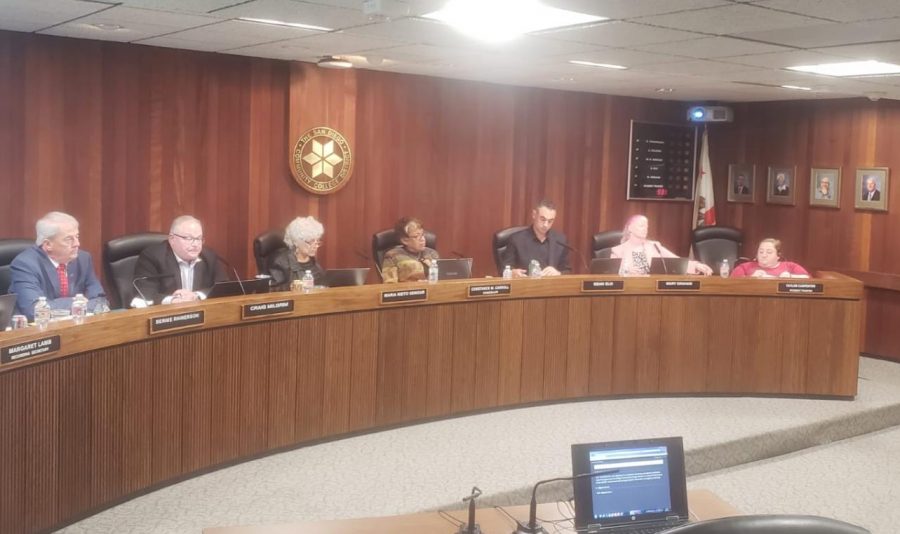SDCCD declares COVID-19 emergency, grants chancellor authority
After and earlier notice that classes are going online, many students and faculty still have questions
The district board Board of Trustees voted unanimously to declare an emergency due to COVID-19 at its March 12 meeting. Photo by Jesse Altilio/City Times
March 13, 2020
The San Diego Community College District Board of Trustees held a meeting on Thursday, March 12 at the SDCCD offices in Mission Valley.
The board voted unanimously to declare an emergency due to COVID-19 and authorized Chancellor Constance Carroll to take action even between board meetings, enabling her to stay on top of this rapidly evolving situation.
The board made it clear they are doing everything in their power to ensure that all SDCCD students are kept safe and able to continue attending class, including those without computers and internet access, but Carroll said that they cannot make a decision on whether to stay open at this time.
“The resolution … before the board today does two things,” Carroll said. “It would have the board declare an emergency within our district, which will be very helpful in our planning and recognizing the actual situation for what it is.
“Second, assigning to the chancellor authority to take action between board meetings that may be necessary to keep people safe.”
This evening, the @sdccd Board of Trustees held a special meeting and declared an emergency due to the coronavirus situation and authorized the chancellor to take actions to manage the district’s response including ensuring continuity of operations and instruction. #StudentsFirst pic.twitter.com/YwtH1B4K50
— Jack Beresford (@SDJackB) March 13, 2020
The meeting addressed various topics concerning SDCCD schools, including the rapidly developing situation with COVID-19.
The Associated Students Government raised concerns about uncertainties around classes. Speaking to the board, City College ASG Senator Keith Dolderer questioned whether the decision to temporarily move students to online classes would have exceptions for students and faculty who wish to continue attending school on campus.
“If some of the teachers and the students request to continue to go to campus, is there a way to implement some kind of waiver form that would allow students and faculty, given that everyone is in agreeance within whatever classroom, to be able to attend classes there? This was brought up to me by many students,” Dolderer said.
Mesa College Associated Students representative Kilma Lattin also spoke about the uncertainty and concerns of Mesa students.
“There is confusion,” Lattin said. “It seems like nobody really knows from a leadership standpoint, so we’re looking forward to clear direction, however that comes about.
“Mesa College has been great with information and has been forthcoming, so on behalf of students who I represent, I’m excited to hear that (the board is) talking about it.”
Carroll acknowledged the challenges of making decisions in circumstances that she called unprecedented.
“We haven’t seen a pandemic like this in decades,” she said. “Many institutions have closed completely. Most are in the process of (deciding how) to keep the student body safe … by not forcing them into group interaction.
“How do we keep continuity of our operations and instruction while we are surrounded by a barrage of data and directives? (It’s a) very fast-moving situation. We want to be orderly in phasing in changes.”
Carroll said the first changes will come after assessing which classes can be converted to online, and how quickly it can be done.
“We’re working with professors to see what options there may be,” Carroll said. “What are the options for students who may not be able to take classes online? We’re hoping over the next two weeks we can resolve these issues, and by no later than the end of spring break know what lies ahead.”
Both the board and attendees who made public comments stressed the need for clear directives and frequent updates on whatever decisions that district and school officials feel is necessary.
Carroll also noted that National University Chancellor Michael Cunningham offered up to three classes free of charge to students who need them during the crisis.
“We don’t know what’s going to be necessary,” SDCCD board member Maria Nieto Senour said. “So, I think one of the really important things is to keep communication flowing as much as we can because people will have unique situations or special conditions that we may not anticipate. We will do our best to stay on top of all that.”













